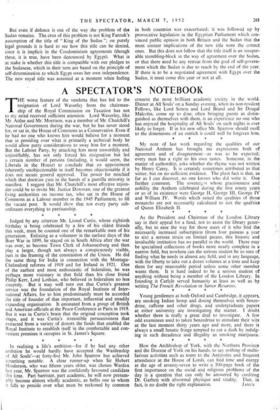A SPECTATOR 'S NOTEBOOK T HE worst feature of the vendetta
that has led to the resignation of Lord Waverley from the chairman- ship of the Royal Commission on Taxation has not to my mind received sufficient attention. Lord Waverley, like Mr. Attlee and Mr. Morrison, was a member of Mr. Churchill's National Government during the war, but he has never stood for, or sat in, the House of Commons as a Conservative. Even if he had no one who knows him would believe for a moment that in presiding over what is primarily a technical body he would allow party considerations to sway him for a moment. But the Labour Party, by attacking him most unworthily and unjustifiably, has not only forced his resignation but led a certain number of persons (including, it would seem, the Liberals in the House) to conclude that an appointment inherently unobjectionable in itself becomes objectionable if it does not secure general approval. The power for mischief which that doctrine puts in the hands of a guerilla minority is manifest. I suggest that Mr. Churchill's most effective rejoin- der could be to invite Mr. Justice Donovan, one of the greatest living authorities on income tax, who sat in the House of Commons as a Labour member in the 1945 Parliament, to fill the vacant post. It would show that not every party sub- ordinates everything to partisanship. -


































 Previous page
Previous page